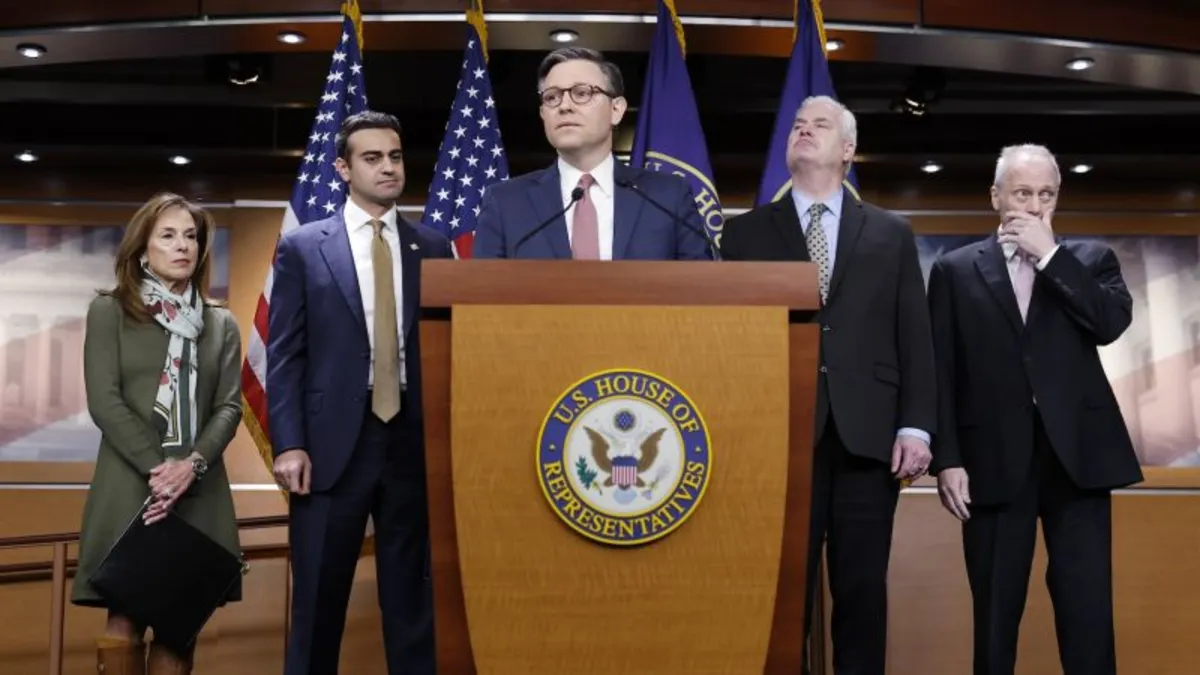
Speaker Mike Johnson is encountering significant hurdles with his budget plan as several GOP hardliners push for last-minute modifications. These changes could potentially alienate the party’s centrist members, jeopardizing leadership's intentions to advance President Donald Trump's agenda in Congress.
Within hours of the House GOP's compromise plan release, fiscal hawks voiced demands for more substantial cuts, exceeding the current reduction target of $1.5 trillion over ten years. However, these proposed cuts pose a challenge for some GOP centrists, like Rep. Don Bacon of Nebraska, who remain undecided about supporting cuts of this magnitude.
House Budget Chairman Jodey Arrington, a Republican from Texas, maintains a confident outlook. Despite this, the backlash from GOP hardliners raises doubts about whether the plan will secure approval in a key committee vote on Thursday, let alone a full House vote by the month's end.
Rep. Andy Ogles, a Tennessee Republican and House Freedom Caucus member, expressed reservations, stating, “As of right now the votes are not there.” He emphasized the ongoing nature of negotiations, describing the plan as a “work in progress.”
Rep. Ralph Norman of South Carolina, a House Budget Committee member, withheld his support, emphasizing a desire for provisions like work requirements for Medicaid and the REINS Act in the final bill. Other committee members, including Reps. Chip Roy of Texas, Tom McClintock of California, and Andrew Clyde of Georgia, refrained from indicating their voting intentions.
Rep. Ben Cline of Virginia, however, signaled a tentative endorsement, stating he is a “lean yes.”
Some GOP members hinted at possible amendments during the Thursday markup, although specifics were not disclosed. Rep. Scott Perry, a Pennsylvania Republican and House Freedom Caucus member, suggested room for improvement, stating, “We’re not done yet.”
The backlash from hardliners persists despite extensive behind-the-scenes negotiations involving Johnson, his leadership team, and the party's right flank. Rep. Eric Burlison of Missouri criticized the spending cuts as “pathetic” and warned of potential opposition from at least six Republicans, a number sufficient to derail the bill given Johnson's narrow margins.
Despite the dissent, Republican leadership allies remain optimistic about the budget measure’s prospects. Rep. Dusty Johnson of South Dakota, involved in negotiations, stated, “The fact that there are some pain points on both ends of the conference, I think, shows that we’re over target.”
He expressed confidence in addressing concerns and achieving success, asserting, “I think we’re going to work through the legitimate concerns people are raising.”
The budget plan mandates at least $1.5 trillion in mandatory spending cuts, aiming for $2 trillion. Many conservatives advocate for a definitive $2 trillion target, fearing otherwise that additional cuts may not materialize.
Achieving this level of cuts likely necessitates savings in Medicaid, unsettling some centrist-leaning Republicans. Frustration arises from ultraconservatives' demands for changes to Speaker Johnson's initial budget plan, which had outlined more modest cuts.
Rep. Don Bacon expressed a preference for Johnson's earlier plan, which proposed roughly $1 trillion in cuts. He emphasized alignment among GOP leadership, asserting, “I think the speaker had a better plan.”
Rep. Nick LaLota of New York, following a meeting with Johnson, emphasized caution regarding deep cuts to Medicaid and similar programs. He highlighted the importance of aligning with President Trump’s stance on preserving Medicaid.
“We have to be careful,” LaLota stated. “The president has said he doesn’t want to cut Medicaid, and now it’s up to us in the House and the Senate to figure out how to actually put pen to paper on these important issues.”